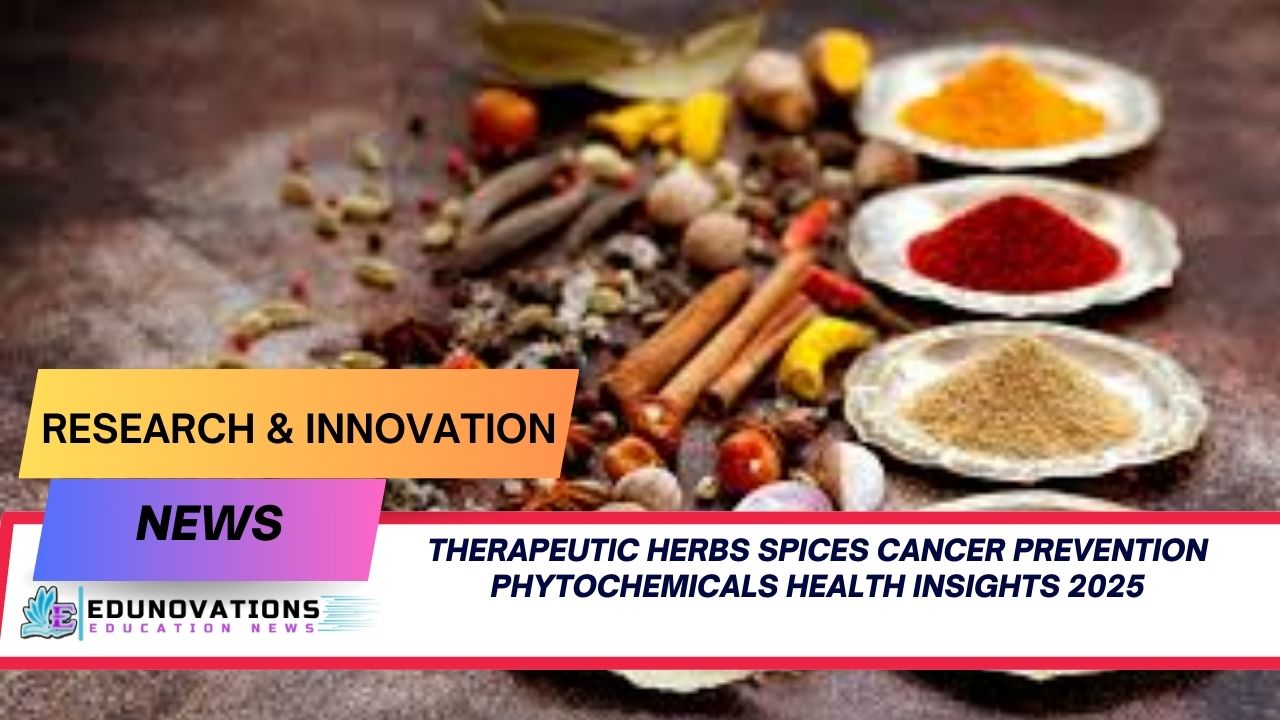Explore how therapeutic herbs and spices contribute to cancer prevention through phytochemicals and natural remedies, enhancing global health strategies.
Introduction
The global conversation on food, nutrition, and healthcare is increasingly moving toward natural solutions rooted in tradition and validated by science. At the 6th International Conference on Food Science and Nutrition 2025, hosted by Sri Sathya Sai Institute of Higher Learning (SSSIHL), leading scientists and nutrition experts came together to highlight the crucial role of therapeutic herbs spices cancer prevention phytochemicals health in shaping the future of disease management and wellness.
The conference underscored that food is not just sustenance but medicine, where plant-derived compounds like phytochemicals play a vital role in combating chronic and degenerative diseases. By focusing on herbal remedies, functional foods, and preventive healthcare, the event spotlighted how spices and herbs—long used in Indian households—are emerging as critical tools in the fight against lifestyle-related diseases, particularly cancer.
The Conference Context
Held on August 8, 2025, the conference drew international attention. A keynote by Prof. (Hon.) B. Andallu, an expert in clinical nutrition, emphasized the theme “The Role of Foods in the Fight Against Cancer, with Special Reference to Spices.” Her research-based presentation demonstrated how spices like turmeric, ginger, fenugreek, basil, and curry leaves contain compounds with antioxidant, anti-inflammatory, and anti-carcinogenic properties.
In another plenary session titled “Herbal Remedies for Diseases Caused by Oxidative Stress,” scientists explored how oxidative stress, a major contributor to diseases like cardiovascular disorders, diabetes, and cancer, can be mitigated through diets enriched with herbs and phytochemical-rich foods.
Why Spices Matter in Modern Healthcare
For centuries, Indian kitchens have relied on spices not just for flavor but also for their healing potential. Modern science now validates many of these traditional practices. For example:
- Turmeric (Curcumin): Proven for its anti-carcinogenic and anti-inflammatory effects.
- Ginger: Demonstrated to inhibit tumor growth and reduce oxidative stress.
- Fenugreek: Rich in bioactive compounds that help regulate blood sugar and improve metabolic health.
- Basil: Offers strong antioxidant benefits, protecting cells from free radical damage.
- Curry Leaves: Contain alkaloids and phenolic compounds that support liver health and reduce oxidative stress.
These findings make a compelling case for incorporating herbal remedies oxidative stress diseases functional food benefits into daily diets, bridging the gap between tradition and modern science.
Expert Insights on Functional Foods
According to Dr. Ramesh Kumar, a senior nutrition scientist at the Indian Council of Medical Research (ICMR), “The recognition of spices as functional foods marks a paradigm shift in healthcare. Unlike synthetic drugs, these natural remedies bring fewer side effects and offer holistic benefits by supporting multiple organ systems.”
This aligns with global trends where consumers increasingly demand natural and plant-based solutions for chronic health conditions. With lifestyle-related diseases accounting for over 71% of global deaths (WHO, 2024), the role of phytochemical-rich spices antioxidant anti-inflammatory natural health strategies is more critical than ever.
The Role of Phytochemicals
Phytochemicals, the biologically active compounds in plants, include flavonoids, alkaloids, tannins, and polyphenols. These compounds:
- Neutralize free radicals.
- Reduce chronic inflammation.
- Inhibit cancer cell proliferation.
- Support cardiovascular health.
- Improve immune system response.
Incorporating phytochemicals through everyday diets ensures long-term benefits. This makes the role of turmeric ginger basil in disease prevention and healthcare indispensable for public health strategies.
Global Healthcare Implications
The discussions at the SSSIHL conference emphasized integrating natural spice-based strategies for metabolic degenerative disease into mainstream healthcare. This not only reduces dependency on synthetic drugs but also offers cost-effective solutions, especially in low-income communities.
Countries like India, with a rich heritage of Ayurveda, are uniquely positioned to lead global research and innovation in this space. Partnerships between universities, research institutes, and healthcare providers can further accelerate adoption.
Toppers Use Mind Maps to score more than 95%
NCERT Class 11th Commerce Mind Maps
Add to cartOriginal price was: ₹999.00.₹199.00Current price is: ₹199.00.NCERT Class 12th Chemistry Mind Maps
Add to cartOriginal price was: ₹199.00.₹75.00Current price is: ₹75.00.NCERT Class 12th Commerce Mind Maps
Add to cartOriginal price was: ₹999.00.₹199.00Current price is: ₹199.00.NCERT Class 12th Science Mind Maps
Add to cartOriginal price was: ₹999.00.₹199.00Current price is: ₹199.00.NCERT Mind Maps For Class 10th
Add to cartOriginal price was: ₹999.00.₹199.00Current price is: ₹199.00.
Purchase Today
Internal & External Resources for Learners
For students, aspirants, and researchers keen to explore this topic, here are some resources:
- NCERT Courses – Comprehensive learning modules.
- Current Affairs – Stay updated on education and health-related events.
- Notes – Summarized academic materials.
- MCQs – Test your knowledge with subject-based practice questions.
- Videos – Visual resources for conceptual clarity.
- Syllabus – Structured guides for exam preparation.
- Free NCERT PDFs – Downloadable learning resources.
- NCERT Mind Maps – Visual tools for memory retention.
For schools or institutions looking to set up digital platforms, Mart Ind Infotech provides specialized solutions.
Moving Forward: The Future of Food as Medicine
The conference highlighted a growing global consensus: food must be viewed not only as nutrition but also as medicine. Research on therapeutic herbs spices cancer prevention phytochemicals health provides actionable pathways for governments, healthcare organizations, and individuals to adopt preventive approaches.
By creating dietary guidelines that include phytochemical-rich herbs and spices, communities can significantly reduce the prevalence of lifestyle diseases. This shift towards holistic healthcare will require not only scientific validation but also public awareness campaigns to ensure widespread adoption.
FAQs
Q1. What is the role of therapeutic herbs and spices in cancer prevention?
Therapeutic herbs and spices, rich in phytochemicals, help inhibit cancer cell growth, reduce oxidative stress, and strengthen immunity, making them powerful natural preventives.
Q2. Which phytochemicals are most effective for health improvement?
Flavonoids, polyphenols, and alkaloids are key phytochemicals that provide antioxidant and anti-inflammatory effects beneficial for chronic disease prevention.
Q3. How do herbal remedies help oxidative stress-related diseases?
Herbal remedies neutralize free radicals, lowering oxidative damage that leads to diabetes, heart disease, and cancer.
Q4. Can phytochemical-rich spices replace conventional medicine?
They cannot replace conventional medicine but can complement treatment by offering preventive and supportive health benefits.
Q5. Why are turmeric and ginger significant in healthcare?
Turmeric’s curcumin and ginger’s bioactive compounds reduce inflammation, inhibit cancer growth, and protect against oxidative stress.
Q6. Are there risks associated with consuming too many spices?
Excessive use may cause digestive issues or interact with medications. Moderate daily use is safe and beneficial.
Q7. What are functional food benefits of herbs and spices?
They improve metabolism, strengthen immunity, support cardiovascular health, and reduce chronic inflammation.
Q8. How can natural spice-based strategies help degenerative diseases?
They slow disease progression by reducing oxidative stress, supporting cell regeneration, and enhancing body resilience.
Q9. Is there scientific evidence for phytochemicals in cancer prevention?
Yes, numerous studies show phytochemicals inhibit tumor growth, reduce DNA damage, and support immune functions.
Q10. How can schools and institutions promote awareness about herbal remedies?
Schools can integrate health education programs and partner with digital learning platforms to spread awareness about phytochemicals and functional foods.














